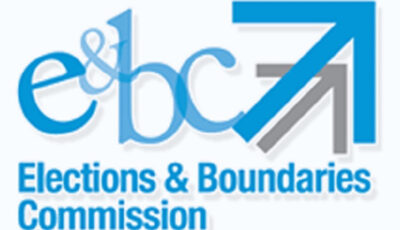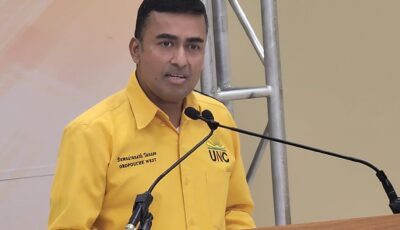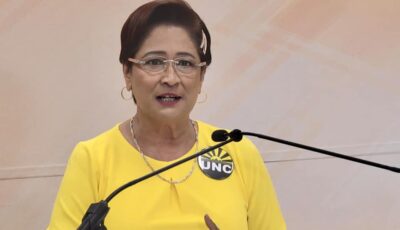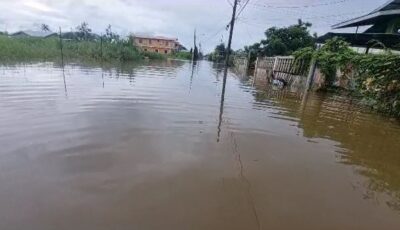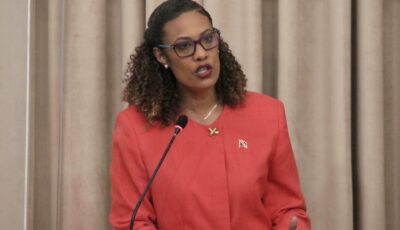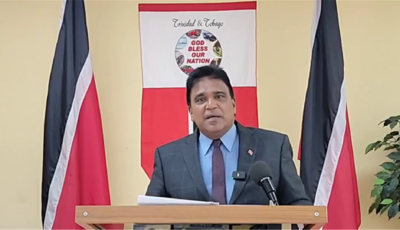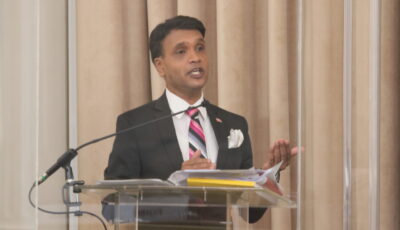Caribbean Leaders agree to Foster a “Cleaner and More Sustainable Energy Future in the Caribbean”
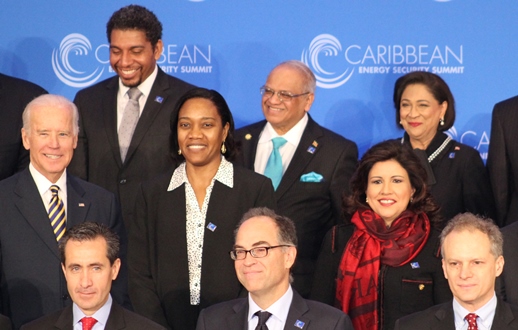
Trinidad and Tobago’s Prime Minister, Kamla Persad-Bissessar SC, stands with other Caribbean leaders, alongside Vice President of the United States, Joe Biden, during the Caribbean Energy Security Summit, at the State Department in Washington DC
26th January, 2015
The Governments of Antigua and Barbuda, Aruba, Bahamas, Barbados, Belize, Canada, Colombia, Curacao, Dominica, Dominican Republic, France, Germany, Grenada, Guyana, Haiti, Jamaica, Mexico, New Zealand, Spain, St. Kitts and Nevis, St. Lucia, St. Vincent and the Grenadines, Suriname, Trinidad and Tobago, United Kingdom, and the United States today stated their commitment to support the Caribbean’s transformation of the energy systems of Caribbean states.
Prime Minister of the Republic of Trinidad and Tobago, Kamla Persad-Bissessar, SC, participated in the First Caribbean Energy Security Summit, hosted by US Vice President Joseph R. Biden, Jr. in Washington, D.C.
In a Joint Statement issued following the Summit, the leaders, together with the Caribbean Community (CARICOM) Secretariat, Caribbean Development Bank, European Union, Inter-American Development Bank Group, International Renewable Energy Agency, Organization of American States, and the World Bank Group agreed to pursue the following, in accordance with national laws:
1. Comprehensive, planning-based and research-driven approaches to energy transition, including implementation of pilot and demonstration projects, based on successful models so that individual clean energy projects are part of a fully integrated, climate-resilient energy transition plan toward clean sustainable energy for all.
2. For Caribbean countries, necessary and specific reforms , including recommendations from the 2013 CARICOM Energy Policy and the outcome of the 2015 Dominican Energy Pact, to support policy and regulatory environments that facilitate the introduction of new technologies favoring sustainable and clean energy that provide legal certainty for investors and improved predictability in price and supply for users.
3. Where viable, alignment of national legal and regulatory approaches to facilitate greater clean energy investment throughout the region, provided that countries can access finance and other resources on affordable terms, to set the stage for future electrical interconnection in keeping with the goals of Connect 2022.
4. Where technically and commercially feasible, promote and develop affordable: (i) no- or lower carbon electricity generation through wind, solar, geothermal power, hydropower, bioenergy, ocean energy, energy recovery from waste, and other clean energies; and (ii) energy efficiency measures. Recognizing also, that alternative fuels, such as natural gas, can play a useful bridging role.
5. Open, transparent, competitive and criteria-based processes, including liberalization where cost effective, to procure energy investment and facilitate access to finance for cleaner and climate resilient energy projects and infrastructure.
6. Data and energy information exchange and coordination with, between, and among countries and stakeholders to minimize duplication and enable the monitoring and evaluation of energy projects to maximize the impacts of efforts toward fully integrated, low carbon and climate-resilient energy transition plans.
Today’s Summit is a follow-up to the launch of the Caribbean Energy Security Initiative (CESI) in June 2014. The Summit highlighted ongoing efforts under the CESI, including support for improved governance, enhanced access to finance, and increased donor coordination.
Caribbean leaders highlighted goals for their energy sectors and discussed how the United States and other partners can better support the Caribbean in pursuit of alternative sources of energy.
They agreed to pursue comprehensive energy diversification programs, including actions to facilitate the introduction of cleaner forms of energy.
During the discussions, Prime Minister Kamla Persad-Bissessar proposed aCaribbean Energy Thematic Fund for CARICOM Member States, to address regional energy security.
END
Click the link below for the Joint Statement issued by the White House:http://www.whitehouse.gov/the-press-office/2015/01/26/caribbean-energy-security-summit-joint-statement
—
Office of the Prime Minister


